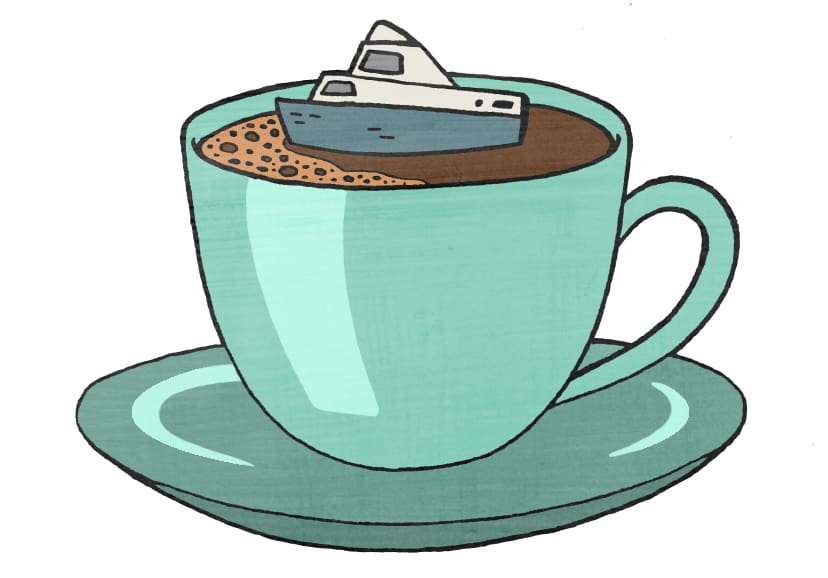Melanie Janisse-Barlow is a poet, artist, and writer who splits her time between a rum-runners era house in Windsor’s Old Walkerville and a houseboat docked beside Ontario Place. We’re posting one chapter a week from Janisse-Barlow’s new memoir, Kalinka. Candid, raw, and full of references to our beloved city, Kalinka is a collection of stories about a woman, a man, and how life on Kalinka, their houseboat, has shaped their journey. We’re excited to share Janisse-Barlow’s writing with you and also delighted to pair with local illustrator Emily May Rose. Read previous installments here.
It is Monday. The island is crusted with snow. I wake up with Andrew at 6:15 in the morning and keep him company while he makes coffee, has a pee and slips on his long johns. He welcomes me into his monk’s chamber with a clean-up of the chaos he usually lives with—things stowed under the bed and in the closet, counters roughly wiped, leaving sweet, awkward streaks.
I use both of our pillows to prop myself up between the rails of the bed frame, staying deeply wrapped in the covers, warmed by his rough gestures of love and care. Andrew comes out of the bathroom when the espresso machine starts to percolate and begins the task of pouring coffee equally between our cups, whitening it with almond milk. Learning how to inhabit the space of that morning coffee took me a long time.
This exact espresso machine used to be in his massive studio in Windsor, where we spent our first months together. Its crunching and popping is a sound we had welcomed each morning for a year and a half. It is a sound that shocks me into presence. Be here now. It is a sound that ushers in a completely different life—one where I changed what could be changed. That machine is the sound of the new piercing the morning. It is comforting, it is waking. It repeats often but doesn’t become rote. Never loses its meaning. The coffee brewing is a reminder that a new day is opening that is not to be wasted.
Andrew passes me my cup and sets his on the sill, sipping from it occasionally while attending to his attire. The sun comes in over the simple scene of us in the tiny room, a small painting of a cow in a field over our bed, and gossamer weaving hanging like a fine floss from the upper window.
“Let’s go see Kalinka this week.”
I look up at Andrew standing in front of me. He is framed in the sunlight that’s coming through the window. His dark locks are spilling over his forehead. I wish he could have been my teenage love, if only so that I could have known this all longer, so we could have roamed Detroit together, listening to bands, smoking cigarettes on the stairs late at night, conspiring.
“Kalinka?”
“Remember that boat that my friend told me about? The one that we tried to get this fall?”
“Oh, right. But the woman wanted too much money, didn’t she?”
“She did, but let’s go look anyhow.”
“How do we do that? Don’t we need an appointment?”
“Not if we sneak in.”
“Oh my! Okay. Let’s do it!”
“I’ll come right back after work and we’ll go.”
“Okay.”
And so it was done.
Finding my own sovereignty is like a new bird trying to fly. There is no absolute formula. None. There is nothing casual about this new skin suit. I am aware that my life depends on my flailing around in it, flailing towards my present moment like a startled bird. I honk out each morning—”Holy shit, I am still here! What now? What?” Today my answer back was a boat.
I think that I can emerge today. I hear birds singing and cawing as Andrew smiles and grabs my hand in a brushing handshake. I watch him as he pulls on his pants and steel-toed boots, his giant duffel coat, his toque. From my view, piled in covers, as awake as I can be, I wave as he leaves the tiny room, bringing in a brief gust of cold before the door swings shut. I let things settle. I imagine floating.



 Follow Us On Instagram
Follow Us On Instagram
